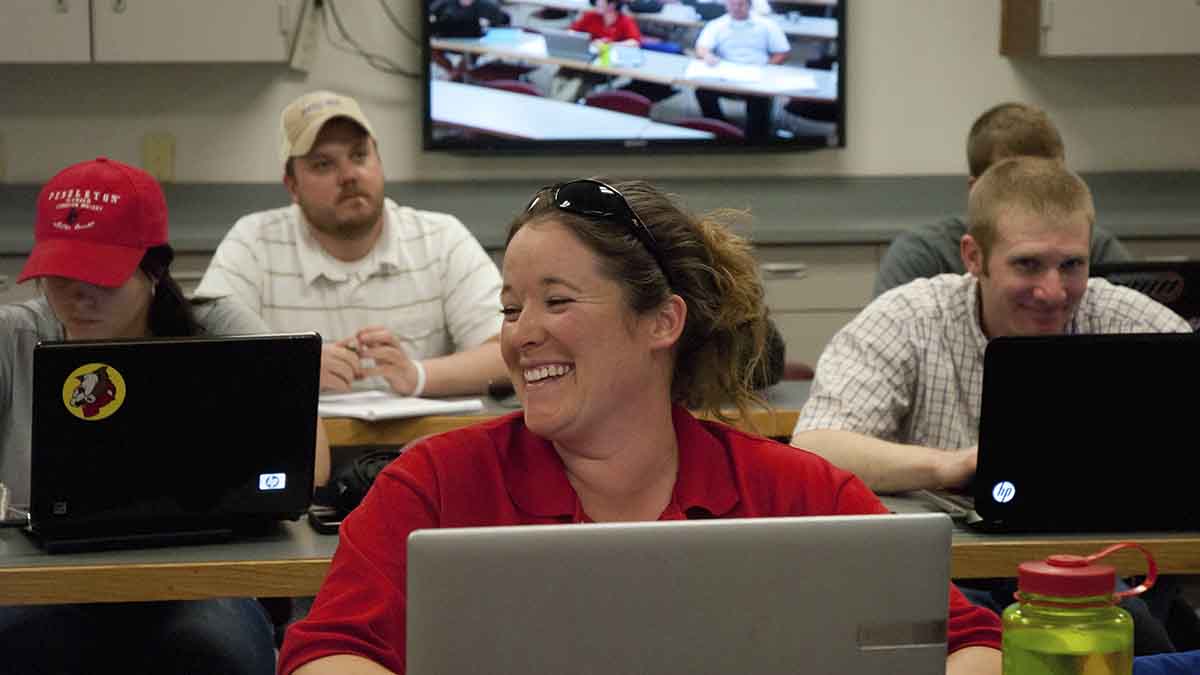30 Years of Remote Learning
June 12, 2024
The internet was in its infancy, VHS tapes were considered modern technology and working remotely wasn’t a thing when University of Idaho’s College of Agricultural and Life Sciences (CALS) first launched a distance bachelor’s degree in agriculture.
Virtual programs and remote courses have become prevalent following the COVID-19 pandemic. In the fall semester of 1994 when CALS welcomed its first distance agriculture class, however, the idea of studying with teachers and classmates from hundreds of miles away was trailblazing.
In its 30 years, the program has provided flexibility for nontraditional students working in the Magic and Treasure valleys — and beyond — to tap expertise from U of I’s Moscow campus and earn a bachelor’s degree without having to quit a job or leave home. The program has helped 268 students working remotely earn degrees, including five graduates on May 11.
“As a land-grant university, part of our mission is to reach the stakeholders across the state,” said Amanda Moore-Kriwox, academic coordinator for a distance degree in agriculture.
The distance degree program, which is offered through the Department of Agricultural Education, Leadership and Communications, started two years after the Twin Falls Research and Extension Center opened on the College of Southern Idaho (CSI) campus. It’s designed as a two-plus-two program, seamlessly building upon an associate degree from CSI or the College of Western Idaho in Nampa. Students can tailor the program to the CALS subject matter of their choosing, selecting up to three interest areas from the various agricultural departments and family and consumer sciences.
Initially the distance program offered a general agriculture major, which eventually changed to agricultural science and technology. The program currently offers a degree in agricultural science, communication and leadership.
“The industry wanted students to have communication and leadership skills to work on teams and work well with others,” Moore-Kriwox said.
In the program’s early days, students would take classes from a room on the CSI campus equipped with large cameras. Professor Benton Glaze taught a course on the genetics of livestock improvement in that classroom, enabling students on the Moscow campus to watch the video feed. Most courses, however, were taught in Moscow, with a video feed sent to the students at the CSI campus. Lectures were also recorded on VHS for students to watch in the Magic Valley. Nowadays, lectures are recorded on Zoom and posted on the university’s online learning management system, Canvas.
The degree prepares graduates to work in a host of jobs, such as agricultural communications, natural resources agencies, agricultural businesses, Extension, marketing and others. The class requires students to complete an internship in the agricultural industry. Opportunities for internships abound in the Magic Valley, which Moore-Kriwox described as the Silicon Valley of agribusiness.
Emerson Kemper, who was among the program’s recent graduates, is coordinator of an in-vitro fertilization lab specializing in high-end dairy and beef genetics based in Jerome, called Boviteq. Kemper also works part time at the U of I Research and Extension Center in Twin Falls. Kemper held associate degrees in health science and agribusiness prior to enrolling in the U of I distance bachelor’s program.
“It’s definitely a great opportunity to get an education while also pursuing a career or starting one,” said Kemper, who specialized in animal science courses. “It also lined up really well with CSI and the credits I already had. They make it super flexible, and the professors were always reaching out and seeing if I needed help.”

About the University of Idaho
The University of Idaho, home of the Vandals, is Idaho’s land-grant, national research university. From its residential campus in Moscow, U of I serves the state of Idaho through educational centers in Boise, Coeur d’Alene and Idaho Falls, nine research and Extension centers, plus Extension offices in 42 counties. Home to more than 12,000 students statewide, U of I is a leader in student-centered learning and excels at interdisciplinary research, service to businesses and communities, and in advancing diversity, citizenship and global outreach. U of I competes in the Big Sky and Western Athletic conferences. Learn more at uidaho.edu.






